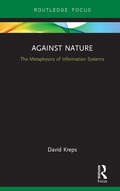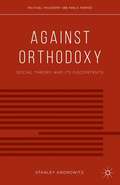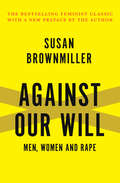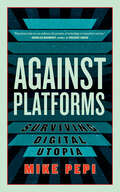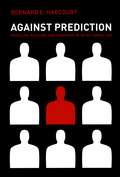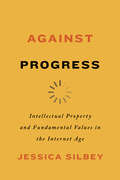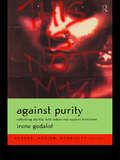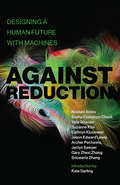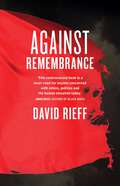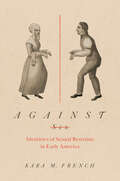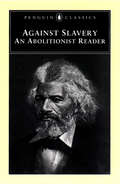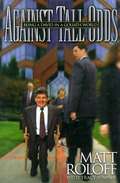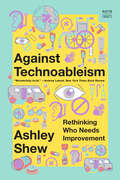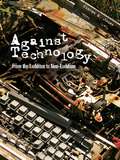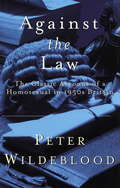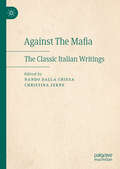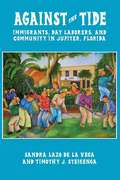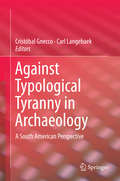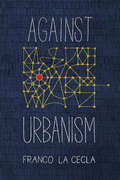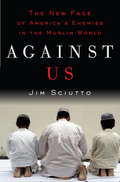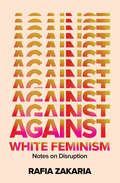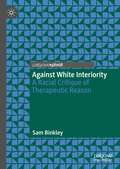- Table View
- List View
Against Nature: The Metaphysics of Information Systems
by David KrepsThis book questions the nature of the business and social information systems so ubiquitous in contemporary life. Linking positivism, individualism, and market-fundamentalist economics at the root of these systems, it critiques the philosophical ground of this triumvirate as fundamentally against nature. Connecting counter-philosophies of the subject as a natural part of existence, with more collectivist and ecological economics, it presents a historical critique of the development of the academic field of information systems and offers a complex view of the nature of Nature through which we might reshape our approach to technology and to our economies to overcome the existential threat of climate change. As such, it will appeal to philosophers, social theorists, and scholars of science and technology studies with interests in the environment and ecology, as well as those working in the field of information systems.
Against Orthodoxy
by Stanley AronowitzIn Against Orthodoxy, the author engages some of the most provocative thinkers of the twentieth century, including Georg Lukacs, Antonio Gramsci, Herbert Marcuse, Karl Marx, Harry Braverman and Paulo Freire. All of these social and political theorists were dedicated to fundamental social change, but many were forced to recognize the difficulty of achieving change in the modern world. This book demonstrates that all of them reject conventional interpretations of how radical change mightbe possible. What marks their unity is an effort to address capitalism's ability to incorporate widespread popular alienation. Consequently they urge serious attention to issues of culture, subjectivity, and education.
Against Our Will: Men, Women and Rape (Pelican Ser.)
by Susan BrownmillerSusan Brownmiller&’s groundbreaking bestseller uncovers the culture of violence against women with a devastating exploration of the history of rape—now with a new preface by the author exposing the undercurrents of rape still present todayRape, as author Susan Brownmiller proves in her startling and important book, is not about sex but about power, fear, and subjugation. For thousands of years, it has been viewed as an acceptable &“spoil of war,&” used as a weapon by invading armies to crush the will of the conquered. The act of rape against women has long been cloaked in lies and false justifications.It is ignored, tolerated, even encouraged by governments and military leaders, misunderstood by police and security organizations, freely employed by domineering husbands and lovers, downplayed by medical and legal professionals more inclined to &“blame the victim,&” and, perhaps most shockingly, accepted in supposedly civilized societies worldwide, including the United States.Against Our Will is a classic work that has been widely credited with changing prevailing attitudes about violence against women by awakening the public to the true and continuing tragedy of rape around the globe and throughout the ages.Selected by the New York Times Book Review as an Outstanding Book of the Year and included among the New York Public Library&’s Books of the Century, Against Our Will remains an essential work of sociological and historical importance.
Against Platforms: Surviving Digital Utopia (Activist Citizens Library)
by Mike PepiA bold and imaginative critique of the hidden costs of digital life – and a manifesto for a better future . . .At the turn of the millennium, digital technologies seemed to have immense promise for transforming our society. With these powerful new tools, the thinking went, we would be free to live our best lives, connected to our communities in ways full of infinite potential.A quarter of a century on, this form of utopianism seems like a cruel mirage. Our lives are more fragmented and pressure-filled as ever, as we race to keep up with technologies that manipulate, command, and drain us at every turn. So what happened? In Against Platforms, technologist and creator Mike Pepi lays out an explanation of what went wrong – and a manifesto for putting it right.The key, says Pepi, is that we have been taught that digital technologies are neutral tools, transparent, easily understood, and here to serve us. The reality, Pepi says, is that they are laden with assumptions and collateral consequences – ideology, in other words. And it is this hidden ideology that must be dismantled if we are to harness technology for the fullest expression of our humanity.
Against Prediction: Profiling, Policing, and Punishing in an Actuarial Age
by Bernard E. HarcourtFrom random security checks at airports to the use of risk assessment in sentencing, actuarial methods are being used more than ever to determine whom law enforcement officials target and punish. And with the exception of racial profiling on our highways and streets, most people favor these methods because they believe they’re a more cost-effective way to fight crime. In Against Prediction, Bernard E. Harcourt challenges this growing reliance on actuarial methods. These prediction tools, he demonstrates, may in fact increase the overall amount of crime in society, depending on the relative responsiveness of the profiled populations to heightened security. They may also aggravate the difficulties that minorities already have obtaining work, education, and a better quality of life—thus perpetuating the pattern of criminal behavior. Ultimately, Harcourt shows how the perceived success of actuarial methods has begun to distort our very conception of just punishment and to obscure alternate visions of social order. In place of the actuarial, he proposes instead a turn to randomization in punishment and policing. The presumption, Harcourt concludes, should be against prediction.
Against Progress: Intellectual Property and Fundamental Values in the Internet Age
by Jessica SilbeyWhen first written into the Constitution, intellectual property aimed to facilitate "progress of science and the useful arts" by granting rights to authors and inventors. Today, when rapid technological evolution accompanies growing wealth inequality and political and social divisiveness, the constitutional goal of "progress" may pertain to more basic, human values, redirecting IP's emphasis to the commonweal instead of private interests. Against Progress considers contemporary debates about intellectual property law as concerning the relationship between the constitutional mandate of progress and fundamental values, such as equality, privacy, and distributive justice, that are increasingly challenged in today's internet age. Following a legal analysis of various intellectual property court cases, Jessica Silbey examines the experiences of everyday creators and innovators navigating ownership, sharing, and sustainability within the internet eco-system and current IP laws. Crucially, the book encourages refiguring the substance of "progress" and the function of intellectual property in terms that demonstrate the urgency of art and science to social justice today.
Against Purity: Rethinking Identity with Indian and Western Feminisms (Gender, Racism, Ethnicity Ser.)
by Irene GedalofAgainst Purity confronts the difficulties that white Western feminism has in balancing issues of gender with other forms of difference, such as race, ethnicity and nation. This pioneering study places recent feminist theory from India in critical conversation with the work of key Western thinkers such as Butler, haraway and Irigaray and argues that, through such postcolonial encounters, contemporary feminist thought can begin to work 'against purity' in order to develop more complex models of power, identity and the self, ultimately to redefine 'women' as the subject of feminism.Theoretically grounded yet written in an accessible style, this is a unique contribution to ongoing feminist debates about identity, power and difference.
Against Reduction: Designing a Human Future with Machines
by Noelani Arista Sasha Costanza-Chock Vafa Ghazavi Suzanne KiteProvocative, hopeful essays imagine a future that is not reduced to algorithms.What is human flourishing in an age of machine intelligence, when many claim that the world&’s most complex problems can be reduced to narrow technical questions? Does more computing make us more intelligent, or simply more computationally powerful? We need not always resist reduction; our ability to simplify helps us interpret complicated situations. The trick is to know when and how to do so. Against Reduction offers a collection of provocative and illuminating essays that consider different ways of recognizing and addressing the reduction in our approach to artificial intelligence, and ultimately to ourselves.Inspired by a widely read manifesto by Joi Ito that called for embracing the diversity and irreducibility of the world, these essays offer persuasive and compelling variations on resisting reduction. Among other things, the writers draw on indigenous epistemology to argue for an extended &“circle of relationships&” that includes the nonhuman and robotic; cast &“Snow White&” as a tale of AI featuring a smart mirror; point out the cisnormativity of security protocol algorithms; map the interconnecting networks of so-called noncommunicable disease; and consider the limits of moral mathematics. Taken together, they show that we should push back against some of the reduction around us and do whatever is in our power to work toward broader solutions.
Against Remembrance
by David RieffIn Against Remembrance, David Rieff provocatively argues that the business of remembrance, particularly of the great tragedies of the past, are policitised events of highly selective memory. Rather than ending injustices, as we expect it to, collective memory in so many cases dooms us to an endless cycle of vengeance. Humanity, he says, simply cannot cope with the true ambivalence of historical events. And if we remember only partially, how can our memories serve us, or our society, as well as we hope?
Against Security: How We Go Wrong at Airports, Subways, and Other Sites of Ambiguous Danger - Updated Edition
by Harvey MolotchHow security procedures could be positive, safe, and effectiveThe inspections we put up with at airport gates and the endless warnings we get at train stations, on buses, and all the rest are the way we encounter the vast apparatus of U.S. security. Like the wars fought in its name, these measures are supposed to make us safer in a post-9/11 world. But do they? Against Security explains how these regimes of command-and-control not only annoy and intimidate but are counterproductive. Sociologist Harvey Molotch takes us through the sites, the gizmos, and the politics to urge greater trust in basic citizen capacities—along with smarter design of public spaces. In a new preface, he discusses abatement of panic and what the NSA leaks reveal about the real holes in our security.
Against Sex: Identities of Sexual Restraint in Early America (Gender and American Culture)
by Kara M. FrenchHow much sex should a person have? With whom? What do we make of people who choose not to have sex at all? As present as these questions are today, they were subjects of intense debate in the early American republic. In this richly textured history, Kara French investigates ideas about, and practices of, sexual restraint to better understand the sexual dimensions of American identity in the antebellum United States. French considers three groups of Americans—Shakers, Catholic priests and nuns, and followers of sexual reformer Sylvester Graham—whose sexual abstinence provoked almost as much social, moral, and political concern as the idea of sexual excess. Examining private diaries and letters, visual culture and material artifacts, and a range of published works, French reveals how people practicing sexual restraint became objects of fascination, ridicule, and even violence in nineteenth-century American culture. Against Sex makes clear that in assessing the history of sexuality, an expansive view of sexual practice that includes abstinence and restraint can shed important new light on histories of society, culture, and politics.
Against Slavery
by VariousAssembles more than forty speeches, lectures, and essays critical to the abolitionist crusade. Features William Lloyd Garrison, Frederick Douglass, Lydia Maria Child, Wendell Phillips, Harriet Beecher Stowe, and Ralph Waldo Emerson. "An invaluable resource to students, scholars, and general readers alike."—Amazon.com.
Against Tall Odds: Being a David in a Goliath World
by Matt Roloff Tracy SumnerRon and Peggy Roloff looked on in shock at the tiny baby before them. What will become of this boy with a stubby body and malformed limbs? As a dwarf, Mathew will have little to look forward to... except dozens of surgeries, years of painful rehabilitation, and daily encounters withthe pitying stairs of strangers. Matt Roloff wouldn't want life any other way.
Against Technoableism: Rethinking Who Needs Improvement (A\norton Short Ser. #0)
by Ashley ShewOne of BookRiot’s Ten Best Disability Books of the Year Shortlisted for the Inc. Non-Obvious Book Awards “Wonderfully lucid.” —Andrew Leland, New York Times Book Review A manifesto exploding what we think we know about disability, and arguing that disabled people are the real experts when it comes to technology and disability. When bioethicist and professor Ashley Shew became a self-described “hard-of-hearing chemobrained amputee with Crohn’s disease and tinnitus,” there was no returning to “normal.” Suddenly well-meaning people called her an “inspiration” while grocery shopping or viewed her as a needy recipient of technological wizardry. Most disabled people don’t want what the abled assume they want—nor are they generally asked. Almost everyone will experience disability at some point in their lives, yet the abled persistently frame disability as an individual’s problem rather than a social one. In a warm, feisty voice and vibrant prose, Shew shows how we can create better narratives and more accessible futures by drawing from the insights of the cross-disability community. To forge a more equitable world, Shew argues that we must eliminate “technoableism”—the harmful belief that technology is a “solution” for disability; that the disabled simply await being “fixed” by technological wizardry; that making society more accessible and equitable is somehow a lesser priority. This badly needed introduction to disability expertise considers mobility devices, medical infrastructure, neurodivergence, and the crucial relationship between disability and race. The future, Shew points out, is surely disabled—whether through changing climate, new diseases, or even through space travel. It’s time we looked closely at how we all think about disability technologies and learn to envision disabilities not as liabilities, but as skill sets enabling all of us to navigate a challenging world.
Against Technology: From the Luddites to Neo-Luddism
by Steven E. JonesThis book addresses the question of what it might mean today to be a Luddite--that is, to take a stand against technology. Steven Jones here explains the history of the Luddites, British textile works who, from around 1811, proclaimed themselves followers of "Ned Ludd" and smashed machinery they saw as threatening their trade. Against Technology is not a history of the Luddites, but a history of an idea: how the activities of a group of British workers in Yorkshire and Nottinghamshire came to stand for a global anti-technology philosophy, and how an anonymous collective movement came to be identified with an individualistic personal conviction. Angry textile workers in the early nineteenth century became romantic symbols of a desire for a simple life--certainly not the original goal of the actions for which they became famous. Against Technology is, in other words, a book about representations, about the image and the myth of the Luddites and how that myth was transformed over time into modern neo-Luddism.
Against The Law
by Peter Wildeblood'This right which I claim for myself and for all those like me is the right to choose the person whom I love' Peter WildebloodIn March 1954 Peter Wildeblood, a London journalist, was one of five men charged with homosexual acts in the notorious Montagu case. Wildeblood was sentenced to eighteen months in prison, along with Lord Montagu and Major Michael Pitt-Rivers. The other two men were set free after turning Queen's Evidence.Against the Law tells the story of Wildeblood's childhood and schooldays, his war service, his career as a journalist, his arrest, trial and imprisonment, and finally his return to freedom. In its honesty and restraint it is eloquent testimony to the inhumanity of the treatment of gay men in Britain within living memory.
Against The Law
by Peter Wildeblood'This right which I claim for myself and for all those like me is the right to choose the person whom I love' Peter WildebloodIn March 1954 Peter Wildeblood, a London journalist, was one of five men charged with homosexual acts in the notorious Montagu case. Wildeblood was sentenced to eighteen months in prison, along with Lord Montagu and Major Michael Pitt-Rivers. The other two men were set free after turning Queen's Evidence.Against the Law tells the story of Wildeblood's childhood and schooldays, his war service, his career as a journalist, his arrest, trial and imprisonment, and finally his return to freedom. In its honesty and restraint it is eloquent testimony to the inhumanity of the treatment of gay men in Britain within living memory.
Against The Mafia: The Classic Italian Writings
by Nando Dalla Chiesa Christina JerneThis collection of classic texts offers a longitudinal overview of the Italian mafia through the eyes of those who have questioned it in the past 144 years. It presents English translations of the key works of, among others, judges (Giovanni Falcone), political theorists (Gaetano Mosca), trade unionists (Pio La Torre), journalists (Giuseppe Fava), generals (Carlo Alberto Dalla Chiesa), and priests (Don Diana). These critical voices have been foundational to shaping the way Italian culture, policies and legislation relate to the mafia phenomenon. They represent different political standpoints, from elitism to communism, as well as vastly different times, from post-feudalism to hyper globalization. This book offers a rare (and hitherto untranslated) insight into, not only the history of the Italian mafia and its conceptualizations, but also into the movement against the mafia, which is one of the longest lasting (and most unrecognized) European social movements. It provides a usefulhistorical archive of Italian political and sociological thought and a diversity of perspectives through which to tackle a complex and increasingly global criminological issue, making it relevant for those interested in Italian studies, political theory, sociology, criminology, legal studies, and history.
Against The Tide
by Sandra Lazo de la Vega Timothy J. SteigengaAcross the United States, the issue of immigration has generated rancorous debate and divided communities. Many states and municipalities have passed restrictive legislation that erodes any sense of community. Against the Tide tells the story of Jupiter, Florida, a coastal town of approximately 50,000 that has taken a different path. At the beginning of the twenty-first century, Jupiter was in the throes of immigration debates. A decade earlier, this small town had experienced an influx of migrants from Mexico and Guatemala. Immigrants seeking work gathered daily on one of the city s main streets, creating an ad-hoc, open-air labor market that generated complaints and health and human safety concerns. What began as a local debate rapidly escalated as Jupiter s situation was thrust into the media spotlight and attracted the attention of state and national anti-immigrant groups. But then something unexpected happened: immigrants, neighborhood residents, university faculty and students, and town representatives joined together to mediate community tensions and successfully moved the informal labor market to the new El Sol Neighborhood Resource Center. Timothy J. Steigenga, who helped found the center, and Lazo de la Vega, who organized students in support of its mission, describe how El Sol engaged the residents of Jupiter in a two-way process of immigrant integration and helped build trust on both sides. By examining one city s search for a positive public policy solution, Against the Tide offers valuable practical lessons for other communities confronting similar challenges.
Against Typological Tyranny in Archaeology: A South American Perspective
by Cristóbal Gnecco Carl LangebaekThe papers in this book question the tyranny of typological thinking in archaeology through case studies from various South American countries (Venezuela, Colombia, Bolivia, Argentina, and Brazil) and Antarctica. They aim to show that typologies are unavoidable (they are, after all, the way to create networks that give meanings to symbols) but that their tyranny can be overcome if they are used from a critical, heuristic and non-prescriptive stance: critical because the complacent attitude towards their tyranny is replaced by a militant stance against it; heuristic because they are used as means to reach alternative and suggestive interpretations but not as ultimate and definite destinies; and non-prescriptive because instead of using them as threads to follow they are rather used as constitutive parts of more complex and connective fabrics. The papers included in the book are diverse in temporal and locational terms. They cover from so called Formative societies in lowland Venezuela to Inca-related ones in Bolivia; from the coastal shell middens of Brazil to the megalithic sculptors of SW Colombia. Yet, the papers are related. They have in common their shared rejection of established, naturalized typologies that constrain the way archaeologists see, forcing their interpretations into well known and predictable conclusions. Their imaginative interpretative proposals flee from the secure comfort of venerable typologies, many suspicious because of their association with colonial political narratives. Instead, the authors propose novel ways of dealing with archaeological data.
Against Urbanism (Green Arcade)
by Franco La CeclaAfter demolishing the myth of the rock star architect with his book Against Architecture, Franco La Cecla now explores the decisive challenges that cities are going to have to confront in the near future. Urban planning and development has become increasingly inadequate in response to the daily realities of life in our cities. Human, economic, ethnic, and environmental factors are systematically overlooked in city planning and housing development, and anachronistic, sterile, and formalistic architecture almost invariably prevails. Never more than today has democracy played itself out in public spaces, sidewalks, and streets. Urban planners and developers, however, are still prisoners of an obsolete vision of passivity which betrays actual city needs and demands. A new urban science is required which can, first of all, guarantee a civil, dignified life for all—urban development which ensures the right to a humane mode of daily living, which has been and still is completely ignored.
Against Us: The New Face of America's Enemies in the Muslim World
by Jim Sciutto"A solid job of reporting, a personal journey of discovery, and a wake-up call for all who read it. " --Charles Gibson, ABC News. After nearly one hundred assignments for ABC News in Muslim countries, Jim Sciutto brings back this disturbing truth: the Al-Qaeda-inspired view of an evil America bent on destroying Islam has moved from the fringes to the mainstream. Sciutto profiles a cross-section of people in the Arab world, including a former Al-Qaeda jihadi turned electrician in Saudi Arabia, a Jordanian college student willing to risk his life by killing Americans in Baghdad, a Christian woman who supports Hezbollah in Lebanon, bitter pro-democracy advocates in Egypt who feel betrayed by the United States, and British-born Muslim terrorists living in London. The result is an alarming portrait of the depth and scope of anti-American sentiment. Yet there is hope for America to turn the tide of hate. Democratic ideals are still held in high esteem, even as America's perceived actions against Muslims are not, and President Obama's election has raised hopes for change among many Muslims. Against Us is an urgent wake-up call for all Americans--and in particular those charged with formulating U. S. foreign policy--to rebuild relations with the Arab world and restore confidence in American values.
Against Violence against Women
by Rona M. FieldsResponding to the targeted destruction of women, Fields argues for establishing Gender as a protected class under the Genocide Convention. Cases are explored, historically, anthropologically, psychologically and sociologically, from the author's field research, as well as focuses on morbidity, mortality and demographic documentation data.
Against White Feminism: Notes On Disruption
by Rafia ZakariaA radically inclusive, intersectional, and transnational approach to the fight for women’s rights. <p><p> Upper-middle-class white women have long been heralded as “experts” on feminism. They have presided over multinational feminist organizations and written much of what we consider the feminist canon, espousing sexual liberation and satisfaction, LGBTQ inclusion, and racial solidarity, all while branding the language of the movement itself in whiteness and speaking over Black and Brown women in an effort to uphold privilege and perceived cultural superiority. An American Muslim woman, attorney, and political philosopher, Rafia Zakaria champions a reconstruction of feminism in Against White Feminism, centering women of color in this transformative overview and counter-manifesto to white feminism’s global, long-standing affinity with colonial, patriarchal, and white supremacist ideals. <p><p> Covering such ground as the legacy of the British feminist imperialist savior complex and “the colonial thesis that all reform comes from the West” to the condescension of the white feminist–led “aid industrial complex” and the conflation of sexual liberation as the “sum total of empowerment,” Zakaria follows in the tradition of intersectional feminist forebears Kimberlé Crenshaw, Adrienne Rich, and Audre Lorde. Zakaria ultimately refutes and reimagines the apolitical aspirations of white feminist empowerment in this staggering, radical critique, with Black and Brown feminist thought at the forefront.
Against White Interiority: A Racial Critique of Therapeutic Reason
by Sam BinkleyThis book presents a bold critique of the new racial sensibility that has attained global prominence following the police murder of George Floyd. Through a set of managerial and therapeutic discourses, this new sensibility describes the inner racial life of white subjects, inducing them to adopt a therapeutic attitude toward deeply interiorized white emotions and conflicts. In so doing, the new racial sensibility promises to remake whiteness in the image of the self-aware racial ally. However, such an appeal, it is argued, serves the subtle function of the preservation of white racial dispositions, and the reproduction of the very racism it sets out to transform. Adopting a critical lens derived from Michel Foucault’s analysis of sexuality, together with an engagement with sociological, psychoanalytic and phenomenological reflections on shame as a racial affect, a critique of white interiority considers alternative frames through which white anti-racist subjection might be imagined.
